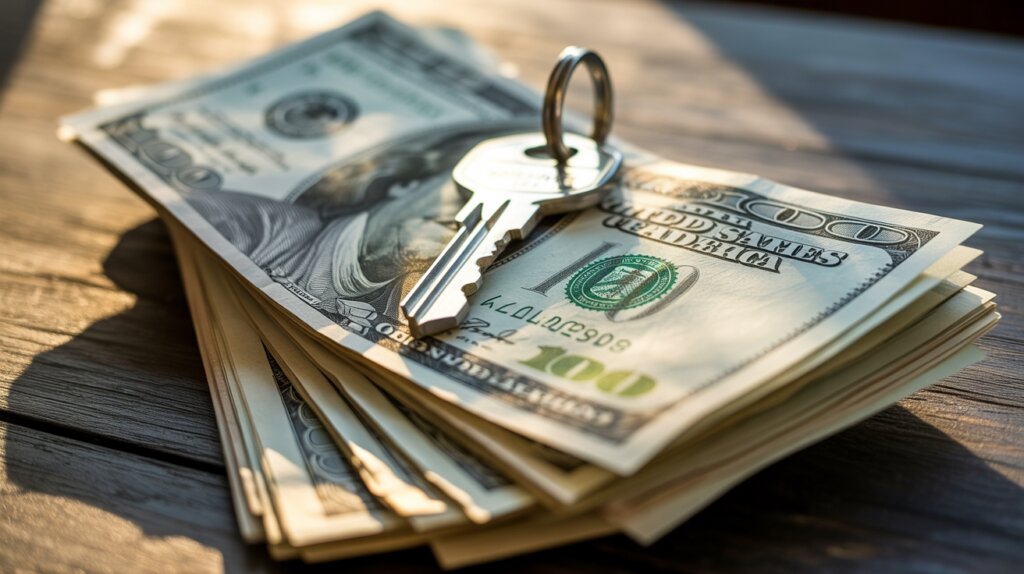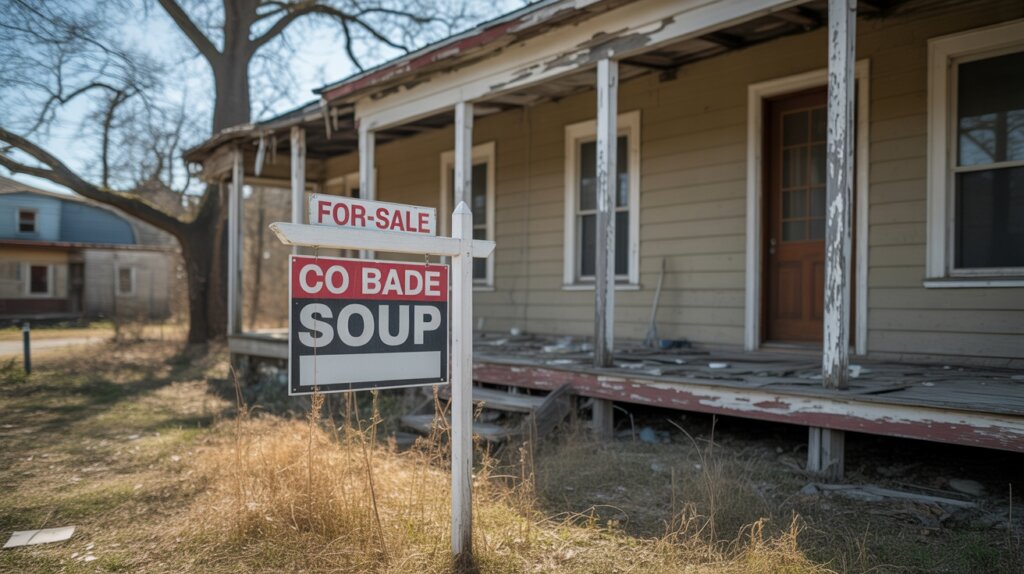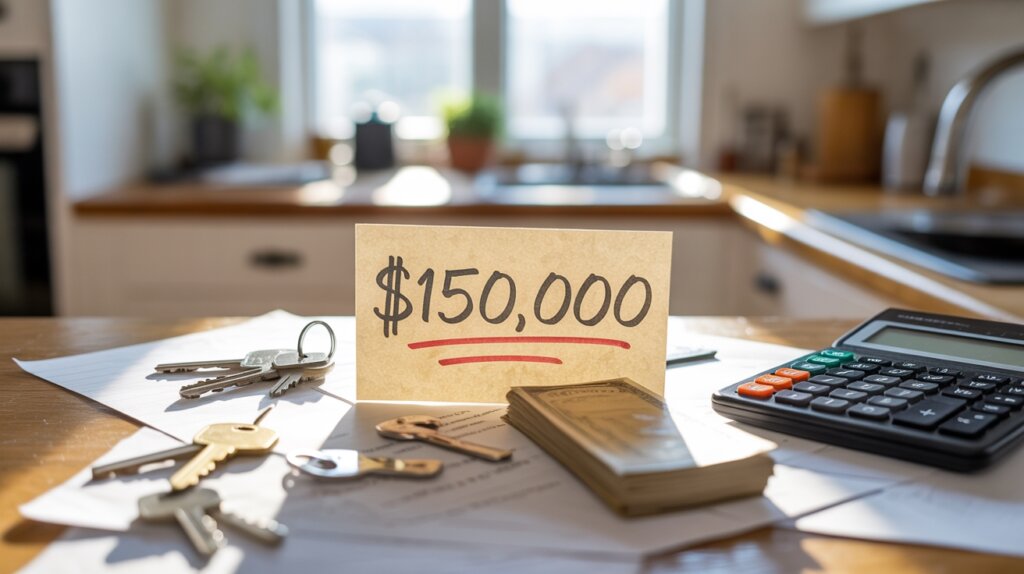Homeowners facing foreclosure, inheriting property, or dealing with distressed homes often consider selling for cash. The process sounds simple, but many sellers wonder about the actual numbers they’ll receive.
Cash home buyers typically offer 50%-85% of a home’s after-repair value, with 70% as a common benchmark. The deduction considers repair costs and investor margins.
In this blog post, you’ll learn how cash buyers determine prices, compare different buyer types, and discover ways to verify legitimate offers.
Key Takeaways
• Cash home buyers offer between 50%-85% of after-repair value, depending on property condition and repairs needed
• The 70% rule is a common formula investors use to calculate offers on distressed properties
• Three main buyer types exist: fix-and-flip investors, iBuyers, and buy-and-hold investors—each offers different prices
• Sellers accept 10-20% below retail value according to .gov housing reports, trading price for speed and convenience
• Fast closing timelines average under 2 weeks for cash transactions versus months with traditional sales
• Missouri Revised Statutes Chapter 339 governs all real estate transactions, including as-is home sales
• Sellers should verify buyer legitimacy through the Missouri Secretary of State and Attorney General’s Office
How Are Offers Determined by Investors?

Real estate investors use a systematic formula to determine as-is cash offers. The calculation starts with your home’s potential market value after repairs. Property investors then subtract estimated repair costs and their required profit margin.
This approach ensures house buying companies can cover renovation expenses and business costs. Direct home buyers must account for holding costs, financing, and resale risks. The formula protects their investment while providing you a fair cash offer.
Property valuation forms the foundation of every cash purchase discount. Home assessment professionals evaluate comparable sales in your neighborhood. They determine what your house would sell for in perfect condition.
After-Repair Value (ARV)
After-repair value represents what your home could sell for on the open market. Real estate cash offers start by analyzing recently sold comparable properties. These comparables must be in similar condition and location to yours.
Property cash assessment experts look at finished square footage and bedroom counts. They examine sales from the past 3-6 months in your area. Kansas City’s local market conditions—such as neighborhood demand, property condition, and seasonality—directly influence investor offers.
Housing market trends play a major role in ARV calculations. Neighborhood demand affects how high buyers will set the after-repair value. Seasonality can shift values by several percentage points throughout the year.
Repair Costs
Repair costs directly reduce the cash offer you’ll receive from buyers. Fixer-upper buyers conduct thorough inspections to identify all necessary repairs. They estimate costs for structural issues, cosmetic updates, and code violations.
House flippers typically add a 10-15% contingency buffer to repair estimates. This buffer protects them from unexpected problems discovered during renovation. Major systems like roofing, HVAC, and plumbing receive careful scrutiny.
The extent of repairs needed determines whether you’ll receive 50% or 85% of ARV. Minor cosmetic issues result in higher offers than major structural problems. Distressed property buyers account for permits, labor, and materials in calculations.
Property condition impact becomes clear when buyers show detailed repair breakdowns. You’ll see line-item costs for everything from paint to foundation work. No repairs needed properties naturally receive offers closer to market value.
Investor’s Margin
Investor’s margin represents the profit house buying companies need to stay in business. Fix-and-flip investors typically target 15-25% profit on each transaction. This margin covers business operations, taxes, and investment risk.
Buy-and-hold investors may accept lower margins since they earn rental income. Their business model focuses on long-term appreciation and cash flow. Investors identify as fix-and-flip, buy-and-hold, or iBuyer models, with each model affecting repair estimate strictness and price offers.
The margin also protects against market fluctuations during the renovation period. Property investors face risks like extended holding times and unexpected repairs. Their profit requirement ensures they can survive deals that don’t go perfectly.
Different types of cash buyers require different profit margins based on risk. iBuyers use algorithms and may accept thinner margins due to volume. Corporate home buyers have overhead costs that influence their required returns.
What Factors Influence the Offer Amount?
Multiple variables affect how much cash buyers will pay for your property. Local real estate dynamics play a major role in final offer amounts. The specific buyer type and their business strategy also impact pricing.
Your property’s condition creates the most significant price variation. Homes requiring extensive repairs receive lower offers than move-in-ready properties. Investment property buyers adjust offers based on their analysis of risk versus reward.
Local Market Conditions
Local market conditions in Kansas City, Missouri determine baseline property values. Neighborhoods with high demand command better offers from direct home buyers. Areas with strong employment and good schools attract more buyer interest.
Statistically, cash sales in the Kansas City metropolitan area close significantly faster than mortgage-financed sales. Market value comparison shows prices vary significantly between neighborhoods. Independence and Raytown have different price points than newer developments.
Seasonal factors affect how aggressive house buying companies price their offers. Spring and summer typically bring higher offers due to increased retail demand. Winter months may see slightly lower offers from real estate investors.
Public reports show increased use of cash sales in lower-income, high-vacancy areas according to .gov sources. Vacant property buyers focus on neighborhoods with renovation potential. Housing market trends shift monthly, affecting the cash purchase discount you’ll encounter.
Extent of Repairs Needed
The extent of repairs needed directly correlates with your final cash offer. Foundation issues, roof damage, and outdated systems reduce offers significantly. Cosmetic problems like dated kitchens have less impact on pricing.
Real estate investors categorize repairs into three tiers: minor, moderate, and major. Minor repairs include paint, flooring, and landscaping improvements. Moderate repairs involve kitchen or bathroom updates without structural changes.
Major repairs encompass foundation work, new roofing, or complete system replacements. Properties needing major repairs typically receive offers at 50-60% of ARV. Homes requiring only cosmetic work may fetch 75-85% of after-repair value.
Distressed property buyers provide detailed repair estimates to justify their offers. You’ll receive breakdowns showing exactly what repairs factor into pricing. This transparency helps you understand the below market value offer.
Type of Cash Buyer
The type of cash buyer pursuing your property significantly affects offer amounts. Three primary categories exist: fix-and-flip investors, iBuyers, and buy-and-hold investors. Each category uses different formulas and accepts different profit margins.
Fix-and-Flip Investors
Fix-and-flip investors purchase homes to renovate and quickly resell them. These house flippers need significant profit margins to justify their risk. They typically offer 65-75% of after-repair value for properties needing work.
Their business model requires fast turnaround to minimize holding costs. Fix-and-flip investors pay cash and close quickly, often within 7-14 days. No contingencies mean they won’t back out due to inspection issues.
These property investors absorb all repair costs and market risk. They handle contractor management, permits, and design decisions. Sell house fast goals align perfectly with their business timeline.
Local fix-and-flip investors often provide more personalized service than large companies. They understand Kansas City neighborhoods and can assess value quickly. Their offers may be more flexible based on property-specific factors.
iBuyers
iBuyers are corporate home buyers using technology to make instant offers. Companies in this category use algorithms to calculate property cash value. They offer convenience through online processes and quick closing timelines.
Their offers typically range from 70-80% of market value for move-in-ready homes. iBuyers charge service fees, usually 5-7% of the purchase price. These fees reduce your net proceeds compared to traditional direct cash offers.
The home buying process with iBuyers involves online forms and virtual assessments. You’ll receive an offer within 24-48 hours based on automated valuation. No showings required make the process extremely convenient for busy sellers.
iBuyers generally avoid properties needing significant repairs or in declining markets. They focus on homes in good condition in stable neighborhoods. Their business model prioritizes volume over purchasing deeply distressed properties.
Buy-and-Hold Investors
Buy-and-hold investors purchase properties to rent long-term or keep as portfolio assets. These investment property buyers focus on cash flow and appreciation potential. They may offer 70-80% of current market value depending on rental potential.
Their calculations emphasize rental income projections rather than quick resale. Buy-and-hold investors often pay slightly more than fix-and-flip competitors. They can afford thinner margins since they benefit from ongoing rental revenue.
No repairs needed properties attract premium offers from these buyers. They prefer turnkey rentals requiring minimal work before tenant placement. Properties in strong rental markets receive more competitive offers.
These real estate investors take a longer view on market appreciation. They’re less concerned with immediate profit and more focused on portfolio growth. Inherited property buyers in this category often keep homes in families for generations.
Buyer’s Business Model and Risk Tolerance

Each buyer’s business model and risk tolerance shape their offer strategy. Conservative investors offer lower prices to protect against unforeseen problems. Aggressive investors may pay more to secure inventory in competitive markets.
Wholesalers represent a unique category that doesn’t actually purchase properties. Real estate wholesalers contract properties and assign deals to other investors. Their offers are typically the lowest since they need room for assignment fees.
Sellers must beware of wholesalers representing themselves as direct buyers; ask for proof of funds and transactions. Legitimate direct home buyers provide bank statements or proof of funds letters. They close with their own capital, not by assigning your contract.
Risk tolerance varies based on investor experience and current market conditions. Seasoned property investors may offer more during uncertain economic times. New investors often lowball offers to protect themselves from costly mistakes.
What Are Key Considerations for Sellers?
Sellers must weigh multiple factors beyond just the offer price. Speed, convenience, and avoiding repairs drive many homeowners to cash buyers. Understanding the complete picture helps you make informed decisions.
Financial considerations include hidden costs and net proceeds after all fees. Emotional factors like stress reduction and timeline control matter significantly. Your specific situation determines which benefits outweigh the lower sale price.
Convenience
Convenience ranks as the top reason sellers choose as-is home sales. You avoid spending months preparing your house for traditional listing. No staging needed means you can sell in current condition.
The home selling process becomes dramatically simpler with cash transactions. You skip open houses, repeated showings, and buyer financing contingencies. Direct home buyers handle most paperwork and closing coordination.
Research findings confirm sellers’ primary motives are convenience, rapid closing (usually under 2 weeks), and avoiding repair costs. Time-pressed sellers value this benefit above maximizing sale price. Estate sales and inherited property situations particularly benefit from simplified processes.
No inspections required eliminates the renegotiation phase common in traditional sales. You won’t face last-minute repair requests or price reductions. The certainty of closing brings peace of mind to stressed sellers.
Closing Time
Closing time with cash buyers averages 7-14 days versus 30-60 days traditionally. Fast closing timeline helps sellers facing foreclosure, job relocation, or financial pressure. You receive funds weeks or months sooner than listing with realtors.
Property liquidation speed matters when you’re paying two mortgages or carrying costs. Every month saved represents significant money in your pocket. Quick home purchase arrangements solve urgent financial situations effectively.
Cash transactions eliminate mortgage approval delays and potential financing fall-throughs. Traditional buyers face appraisal issues that can delay or kill deals. Real estate cash offers provide certainty that traditional sales cannot match.
Home selling timeline predictability helps you plan your next move confidently. You’ll know exact closing dates within days of accepting an offer. This certainty is invaluable for coordinating relocations or other time-sensitive matters.
Hidden Costs
Hidden costs exist even in as-is cash transactions, though fewer than traditional sales. Closing costs, title transfers, and disclosure laws apply, even for “as is” cash sales, per Missouri’s real estate statutes. Sellers typically pay for title insurance and transfer taxes.
Some house buying companies charge administrative or processing fees. You should request detailed closing statements before signing any agreement. No commission fees save you 5-6% compared to using realtors.
Avoiding realtor fees represents substantial savings on as-is home sales. A $200,000 house saves $10,000-$12,000 in commissions when selling directly. No closing costs promotions by some buyers mean they cover these expenses.
Tax implications vary based on your situation and property ownership duration. Capital gains taxes may apply depending on profit and exemption eligibility. Consult tax professionals to understand your specific home equity calculation.
Legitimacy
Legitimacy concerns require careful vetting of any cash buyer. Sellers should verify business legitimacy by checking registration with the Missouri Secretary of State and reviewing complaints with the Missouri Attorney General’s Office. This protects you from scam artists and fraudulent operators.
Missouri Revised Statutes Chapter 339 governs real estate brokers and salespersons. All real estate investors and cash buyers must comply with these regulations when operating in Kansas City. Licensed professionals follow ethical standards and legal requirements.
The Missouri Merchandising Practices Act (Chapter 407, RSMo) protects against deceptive business practices, which can include misleading cash offer tactics. You have legal recourse against companies using deceptive practices. Reporting suspected fraud protects other homeowners from similar experiences.
Request references from previous sellers and proof of successful closings. Legitimate buyers willingly provide testimonials and transaction histories. They maintain professional offices and clear communication throughout the process.
What Is the 70% Rule and How Does It Affect Your Offer?

The 70% rule is a standard formula real estate investors use nationwide. This rule states investors should pay no more than 70% of ARV minus repair costs. The formula protects investors while providing sellers quick cash solutions.
Case studies from .gov housing reports show sellers accept lower prices—often 10-20% below retail—for as-is cash deals to gain speed and certainty. The 70% benchmark represents industry standard for distressed properties. Properties in better condition may command higher percentages.
Calculation example: A home with $200,000 ARV needing $30,000 in repairs yields $110,000 offer. The math works as follows: $200,000 × 0.70 = $140,000, then $140,000 – $30,000 = $110,000. This formula ensures investors profit while you avoid repair hassles.
The rule accounts for investor acquisition costs, holding expenses, and profit margins. Property investors in competitive markets may increase to 75% or 80%. Conversely, high-risk properties might see offers at 60% or below.
You can use this rule to evaluate whether offers are reasonable. Compare multiple offers against the 70% benchmark for your property. Understanding this formula prevents disappointment and helps set realistic expectations.
How Do Different Types of Cash Buyers Compare on Price?
Different cash buyer types offer varying price points based on business models. Fix-and-flip investors typically offer 65-75% of ARV for renovation projects. iBuyers may offer 75-85% but charge service fees reducing net proceeds.
Buy-and-hold investors fall somewhere in the middle, offering 70-80% of value. Their offers depend heavily on rental income potential in your area. Neighborhoods near Liberty, Platte City, and Smithville have strong rental demand.
Real estate wholesalers present the lowest offers, often 50-65% of ARV. They need room to assign contracts to end buyers for profit. Direct cash offers from actual buyers provide better terms than wholesaler deals.
Price comparison requires analyzing net proceeds after all fees and costs. An 80% offer with 7% fees nets less than a 75% offer with no fees. You must calculate actual dollars received, not just percentage of value.
Buyer comparison checklist should include:
• Percentage of ARV or market value offered
• Service fees, commissions, or processing charges
• Closing timeline and flexibility
• Proof of funds and company legitimacy
• References from previous sellers
What Are the Trade-Offs Between Cash Offers and Traditional Sales?
Cash offers provide speed and convenience at the cost of lower proceeds. Traditional sales maximize price but require time, effort, and uncertainty. Your circumstances determine which trade-offs make sense for your situation.
Selling without realtor means you handle negotiations but save commission fees. Traditional listing involves staging, showings, and ongoing property maintenance. Quick home sale through cash buyers eliminates these hassles entirely.
Price difference typically ranges from 10-20% lower for cash transactions. A $200,000 retail home might fetch $160,000-$180,000 from cash buyers. You must decide whether speed and convenience justify this difference.
Foreclosure prevention situations often make cash sales the only viable option. Underwater mortgage solutions through cash sales can help avoid credit damage. Time-sensitive scenarios favor cash buyers despite lower prices.
Traditional sale advantages include:
• Higher sale price (10-20% more typically)
• Multiple buyer competition driving up offers
• Retail buyers paying full market value
Cash sale advantages include:
• Fast closing (7-14 days average)
• No repairs, staging, or showings required
• Certainty of closing without financing contingencies
• Reduced stress and simplified process
How Can You Verify a Cash Buyer’s Legitimacy and Offer?
Verification protects you from scams and ensures smooth transactions. Start by checking business registration with the Missouri Secretary of State online. Legitimate companies maintain active business licenses and good standing.
Review complaints through the Missouri Attorney General’s Office consumer protection division. Companies with multiple unresolved complaints should raise red flags. Better Business Bureau ratings provide additional legitimacy indicators.
Request proof of funds showing the buyer can actually close. Bank statements or lender letters confirm they possess necessary capital. Wholesalers cannot provide proof of funds since they don’t actually purchase properties.
Ask for references from at least three recent sellers. Contact these references directly to verify positive experiences. Legitimate buyers proudly share successful transaction histories.
Verify the buyer’s physical office location in Kansas City, Missouri or surrounding areas. Companies with only P.O. boxes or no local presence deserve extra scrutiny. Meet in person when possible to assess professionalism.
Review all contracts with a real estate attorney before signing. Missouri law requires certain disclosures even in as-is sales. Professional legal review costs a few hundred dollars but prevents costly mistakes.
Compare multiple offers from different house buying companies simultaneously. This competition ensures you receive fair market offers. Three to five offers provide adequate comparison data.
Ready to Sell Your House As Is to Limitless Homes of KC?
Limitless Homes of KC serves homeowners throughout Kansas City, Missouri and surrounding communities. We are cash home buyers who understand the challenges of selling distressed or unwanted properties. Our team provides fair cash offers and closes on your timeline.
We purchase homes in Independence, Raytown, Excelsior Springs, Missouri City, Liberty, Platte City, Smithville, and other popular areas. You’ll receive a no-obligation offer within 24 hours of contacting us. Our straightforward process eliminates hassles associated with traditional home sales.
Contact Limitless Homes of KC today to receive your fair cash offer. We handle all paperwork, cover closing costs, and close in as few as seven days. You choose the closing date that works best for your situation.

